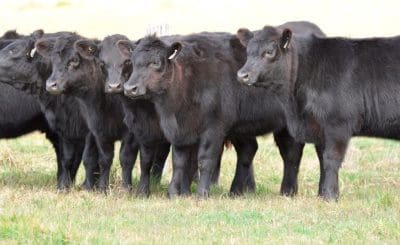AN important animal health vaccine used widely in the cattle lotfeeding and backgrounding sectors is in short supply, due to a combination of factors including vaccine production challenges and dramatic growth in product demand in Australia.
Shortages have emerged for Zoetis’ Rhinogard vaccine, used to control rhinotracheitis as part of broader IBR respiratory disease complex.
 Talk about the vaccine access challenges was circulating during Brisbane’s Ekka producer gathering last week, which is seeing long-standing customers (mostly feedlots) being prioritised for access to the product through veterinarians to protect the most at risk cattle.
Talk about the vaccine access challenges was circulating during Brisbane’s Ekka producer gathering last week, which is seeing long-standing customers (mostly feedlots) being prioritised for access to the product through veterinarians to protect the most at risk cattle.
Zoetis’ business unit director Fred Schwenke told Beef Central a number of factors – both supply and demand driven – had accumulated to create the shortage.
“The manufacture of live vaccines is a biological process, and things can go wrong. A range of tests are carried out on each batch, and in this case, based on results, the manufacturing site was not able to release it,” Mr Schwenke said.
“We expect to be fully back in stock in late September, when the next batch arrives,” he said.
“Until then, we obviously wanted to support our loyal, long-term customers and areas of highest need with priority access to limited stocks.”
With culturing involved, live vaccine manufacture was not a simple process like turning on a light-switch, he said, and could take five months from start to finish.
Rapid growth in demand
On the demand side of the equation, there has been dramatic growth in demand for Rhinogard vaccine this year with lot feeders, and an increased demand in the backgrounding sector.
Some of that has been driven by an important regulatory change made in 2023 (see earlier article) which saw Rhinogard changed from a Schedule 4 product (veterinary only) to an over-the counter product which has seen an increase in the accessibility for producers.
Fanning the flames further has been the sheer growth seen in lot feeding activity across Australia, which hit a record high in the March quarter of 1.35 million head.
In many ways, the current Rhinogard product shortage has been a perfect storm.
“We are trying hard to manage the current situation as best we can,” Mr Schwenke said. “We’re talking with the cattle veterinarian community, and they are cooperating with us to try to maintain the best supply we can to the areas of highest need.”
Zoetis is working to build a bank of ‘safety stocks’ going into 2025, that will help mitigate possible future shortage events.
Perhaps significantly for future supply, Zoetis in March announced a $350 million investment to purchase an eight hectare manufacturing site in Melbourne to expand its current operations (most of Zoetis’ Australian vaccines are already manufactured on this site) and increase future capabilities to manufacture cattle, sheep and horse vaccines.
The site in the Melbourne suburb of Parkville was purchased from the Victorian State Government. It has a rich history of supporting Australian agriculture, going back to the development of a vaccine for blackleg disease in sheep in the 1930s. The investment follows Zoetis’ purchase of the former Jurox manufacturing site at Rutherford in NSW in 2022.
